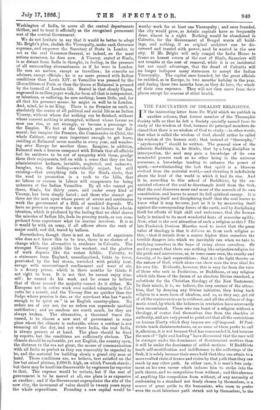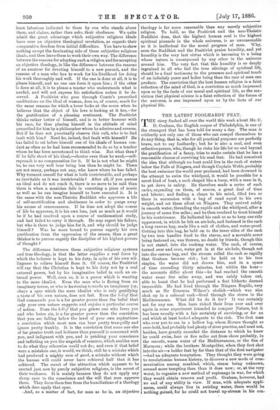THE FASCINATION OF IDEALIST RELIGIONS.
JN the interesting letter from Dr. Wyld which we publish in another column, that former member of the Theosophic Society tells us that he left a Society specially named from its study of the wisdom of God, because its principal members de- clared that there is no wisdom of God to study,—in other words, that what is called the wisdom of God, should rather be called the wisdom of the human soul ; that instead of "theosophy," " psychosophy " should be written. The general view of the atheistic Buddhists is, he thinks, that by a long discipline in introspection, the soul may gain a knowledge of its own wonderful powers such as no other being in the universe possesses, a knowledge tending to enhance the power of spirit,—notwithstanding the fact that spirit is a blossom evolved from the material world,—and elevating it indefinitely above the level of the world in which it had its rise. And it is, according to this school of Buddhists, by the un- assisted efforts of the soul to disentangle itself from the flesh, that the soul discovers more and more of the marvels of its own constitution, and learns to assert its full spiritual energy. It is by scanning itself and disciplining itself that the soul learns to know what it may become, just as it is by measuring itself against the corresponding forces of the earth, and by disciplining itself for efforts of high skill and endurance, that the human body is trained to its most wonderful feats of muscular agility. Now, what is the real attraction of such a religion as this ? The late Frederick Denison Maurice used to insist that the great value of theology is that it delivers us from such religion as this,—that it reveals from a source higher than ourselves the terrible dangers into which we inevitably run when we take to studying ourselves in the hope of rising above ourselves. He used to preach that there was nothing like subjective religion for the pride and narrowness, or, in some cases even, the cruelty and ferocity, of its dark superstitions ; that it is the light thrown on the nature of God, which alone can show man the true ideal for his own life. Evidently, however, this is very far from the view of those who seek in Positivism, or Buddhism, or any religion which rids them of the dream of an absolute Divine standard, a substitute for the Christian theology of the New Testament. In their minds, it is, we believe, the very essence of the attrac- tion, that by denying any Divine initiative, they bring back religion to a mere form of idealism, and so, as they say, get rid of all the controversies as to evidence, and all the stiffness of dog- matic creed, by which the believers in revelation have necessarily been encumbered. Those who can boast of a religion without a theology, of course find themselves free from the shackles of authority, and are very proud to point out that all the restrictions on human liberty which they impose are self-imposed. If Posi- tivists teach disinterestedness, or, as some of them prefer to call it, altruism, it is not because God has commanded it, but because the men of" light and leading" have discovered that the race will be stronger under the dominance of disinterested motives than it will be under the dominance of selfish motives. If Buddhists teach self-mortification and indifference to the sufferings of the flesh, it is solely because their seers hold that they can attain to a more exalted state of trance and vision by that path than they can reach by any other path. In either case, it is man's free lodg- ment on his own career which induces him to strike into the path chosen, and no compulsion from without; and this absence of anything like compulsion from without, of any necessity of conforming to a standard not freely chosen by themselves, is a source of great pride to the humanists, who seem to prefer even the most laborious path struck out by themselves, to the least laborious indicated to them by one who stands above them, and claims, rather than asks, their obedience. We quite admit the great advantage which subjective religious ideals have over an objective theological revelation, as regards their comparative freedom from initial difficulties. You have to show nothing except the fascinating side of these subjective religious ideals, and then leave them to work their own way. The difference between the reasons for adopting sueh a religion and for accepting an objective theology, is like the difference between the reasons of an amateur for devoting himself to a new pursuit, and the reasons of a man who has to work for his livelihood for doing his work thoroughly and well. If the one is done at all, it is to please himself, and no one can force it upon him ; if the other is done at all, it is to please a master who understands what is needed, and will not express his satisfaction unless it be de- served. A Positivist who goes through Comte's prescribed meditations on the ideal of woman, does so, of course, much for the same reasons for which a lover looks at the moon when he believes that the object of his love is looking at it too,—for the gratification of a pleasing sentiment. The Positivist thinks rather better of himself, and is in better humour with his race, for thus placing himself in the attitude of mind prescribed for him by a philosopher whom he admires and reveres. But if he does not punctually observe this cult, who is to find fault with him Need he, indeed, find fault with himself? He has failed to set before himself one of his ideals of human con- duct as often as he had been recommended to do so by a teacher whom he has been accustomed to think wise. But what then ? If he falls short of his ideal,—shorter even than he need,—self- reproach is no compensation for it. If he is not what he might be, he can very well bear being less than he might be. There are not many, perhaps not any, who know where he has failed. Why torment oneself for what is both irretrievable, and perhaps as inevitable as it was irretrievable? After all, if you pursue an ideal and do not reach it, there is no more to be said than there is when a musician fails in executing a piece of music as well as he can imagine himself to have executed it. It is the same with the non-Theistic Buddhist who approves a life of self-mortification and abstinence in order to purge away his excess of sensuousness. If he does not adopt the course of life he approves, it is his own loss, just as much as it would be if he had resolved upon a course of mathematical study, and had failed to early it through. He may regret his failure, but who is there to judge him for it, and why should he judge himself ? Was he more bound to pursue eagerly his own purification from the oppression of the senses, than a great thinker is to pursue eagerly the discipline of his highest powers of thought ?
The difference between these subjective religions systems and true theology, is that the latter supplies a real force by which the believer is kept to his duty, in spite of his own wil- lingness to relieve himself from it. Of course, the Positivist will say that the Christian is kept to his duty not by a real external power, bat by his imaginative belief in such an ex- ternal power. Well, even so, it is a power which is wanting to the mere idealist. Even the man who is fleeing from an imaginary terror, or who is hastening towards an imaginary joy, obeys a spur which the mere idealist who is only gratifying a taste of his own nature, does not feel. Even the belief that God commands you is a far greater power than the belief that only your own nature suggests and enjoins a particular course of action. Even the belief that you grieve one who loves you and who hates sin, is a far greater power than the conviction that you are falling below the level of your own aspirations, a conviction which most men can bear pretty tranquilly and ignore pretty frankly. It is the conviction that some one else of far greater truth and holiness than yourself is concerned with you, and indignant with you, and is pricking your conscience and inflicting on you the anguish of remorse, which enables men to do what they otherwise could not do ; and even if that belief were a mistaken one, it would, we think, still be a mistake which had produced a mighty sum of good, a mistake without which the human will could never have achieved half that it has achieved. The secret of the attraction which appears to be exerted just now by purely subjective religions, is the secret of their weakness. It is mainly because they do not apply any sharp spur to the conscience and the will that men approve them. They deem them free from the humiliations of a theology which does apply that spur.
-And, as a matter of fact, for man as he is, an objective
theology is far more reasonable than any merely subjective religion. To hold, as the Positivist and the non-Theistic Buddhist does, that the highest human soul is the highest spiritual pinnacle in the whole universe, is as unreasonable as it is ineffectual for the moral progress of man. Why, even the Buddhist and the Positivist praise humility, and yet humility is the very last virtue which is becoming to a being whose nature is unsurpassed by any other in the universe around him. The very fact that this humility is so deeply ingrained in all who feel the true stirrings of spiritual life, should be a final testimony to the presence and spiritual touch of an infinitely purer and holier being than the race of man can produce. The conviction that the best human religion is a faint reflection of the mind of God, is a conviction as mach impressed upon us by the facts of our moral and spiritual life, as the con- viction that physical science is a faint reflection of the forces of the universe, is one impressed upon us by the facts of our physical life.



































 Previous page
Previous page